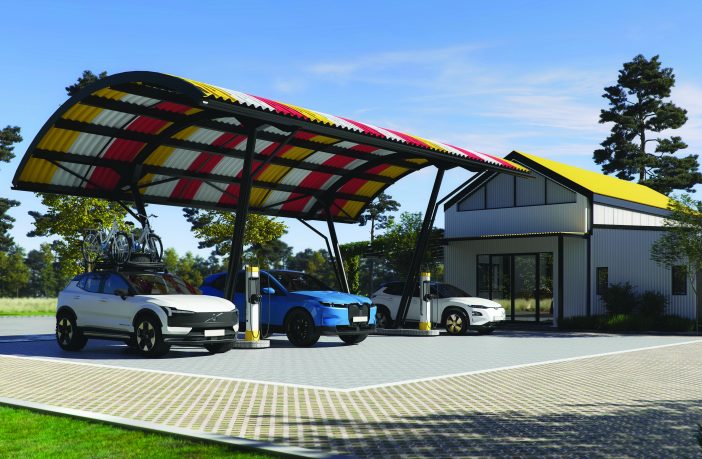- Zero Carbon Charge has broken ground on its first 100% renewable energy charging station in what will become South Africa’s first national network of 120 solar-powered charging facilities spaced out at 150km intervals.
This is a significant milestone in South Africa’s transition to electric vehicles (EVs). Unlike other charging stations that connect to Eskom’s grid (and thus use coal as their primary energy source), Zero Carbon Charge’s charging stations are powered by South Africa’s abundant and renewable supply of sunshine.
“We are thrilled to begin construction of the first 100% renewable energy charging facility in Wolmaransstad today. It is great news for the environment, and it is great news for motorists who won’t have to worry about loadshedding preventing them from charging their vehicles,” said Joubert Roux, Co-Director and Founder of Zero Carbon Charge.
Each Zero Carbon Charge charging station generates electricity on-site using solar PV and stores energy in lithium iron phosphate batteries, with generators fuelled by hydrotreated vegetable oil as a back-up power source. Hydrotreated vegetable oil is used as it offers a reduction of carbon emissions of up to 90% compared to diesel.

Image credit: Zero Carbon Charge
According to Zero Carbon Charge’s other Co-Founder and Director, Andries Malherbe, South Africa needs to prepare for the global transition to EVs: “Zero Carbon Charge is forging ahead in preparation for the EV revolution that is coming to these shores. Within five years, we expect electric vehicles to account for 25% of all new car sales in South Africa. Our network of 100% renewable charging stations will offer consumers a clean and fast way of charging their vehicles,” he said.
Using 720 DC ultra-fast charge points for EVs, plus 240 AC charge points for plug-in hybrids, each Zero Carbon Charge charging station can charge an EV in about 20 minutes. By contrast, it will take a standard ‘on-grid’ AC charging station around 4 hours to fully charge an EV.
It is envisaged that, pending various planning and land use approvals, Zero Carbon Charge will have its full network of solar-powered charging facilities operational by September 2025.
Each Zero Carbon Charge station will include a farmstall so that motorists charging their vehicles can enjoy a quick snack and a cup of coffee in the 20 minutes it will take for their car to be fully charged again.
Zero Carbon Charge’s total investment, worth R1,8bn will boost South Africa’s rural economies by providing local jobs and an additional revenue stream for farmers. Landowners will earn 5% of the revenue generated from vehicle-charging on their land, whilst a percentage of revenue will also be reinvested in local socio-economic development initiatives.
The Zero Carbon Charge facility at Wolmaransstad is due for completion in June 2024.
Author: Bryan Groenendaal















